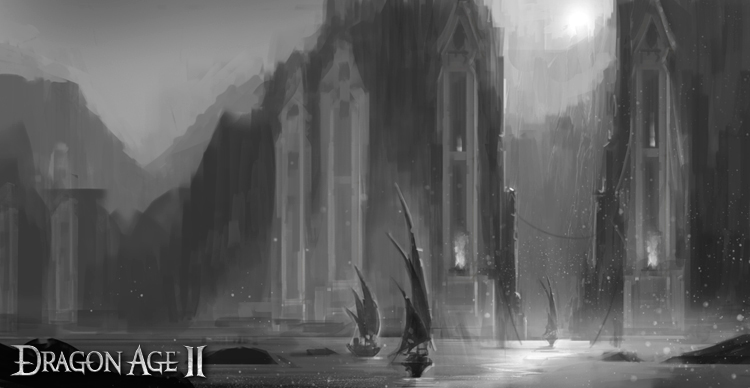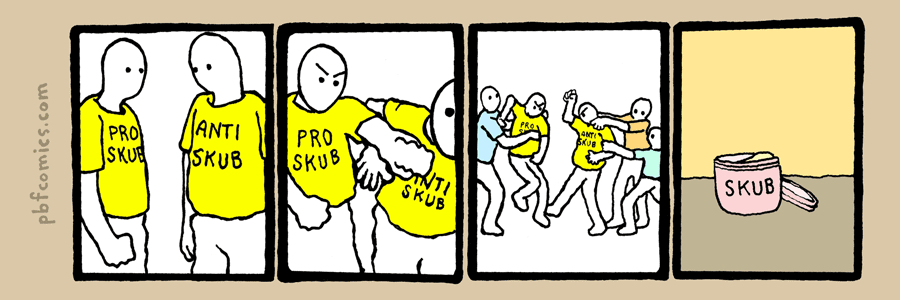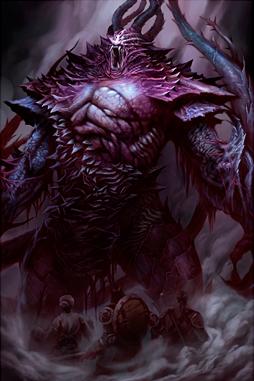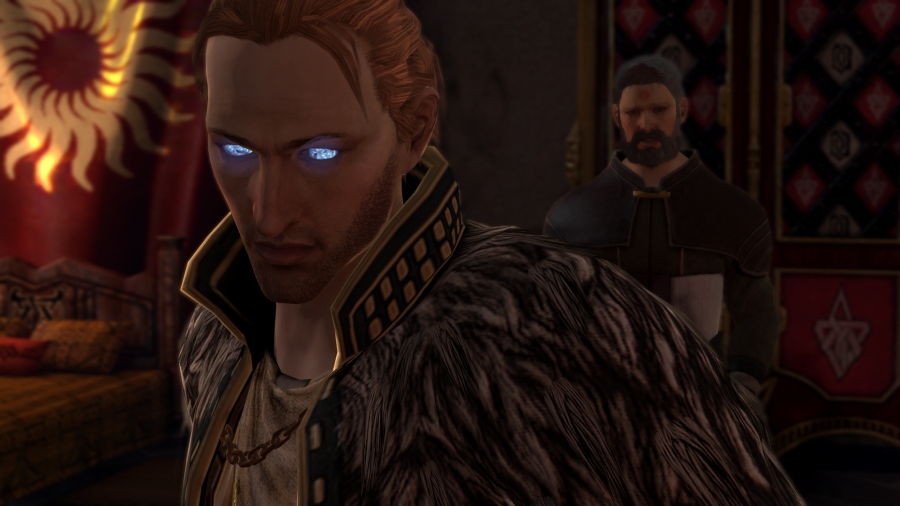This is split into two sections. It’s not intended as a review, more a critique of the game. I’m not trying to sell the game, or discuss it as a purchasable commodity. Just trying to express my thoughts on a game that I genuinely like, but found genuinely frustrating. The two sections are a Non-Spoiler Section and a Spoiler Section. I keep plot talk to a minimum in the first and do pretty much nothing but talk about plot in the second half.
NON-SPOILER SECTION
I love BioWare but there always tends to be a point in their game where the gameplay becomes something of a chore between bouts of dialogue. In Dragon Age 2 that point happens roughly halfway through. It’s not that the combat isn’t great, it plays as tactically and robustly as Origins, it’s just that there’s almost too much of it. In Origins, Baldurs Gate and the Mass Effects there were always moments of calm, where you could get a feel for the world and just wander around. In Dragon Age: Origins I choose to wander to Denerim before embarking on any of the main quests and found that for about six hours I just wasn’t fighting things, I was chatting with people, making enemies stand down, doing tasks for various groups, checking my inventory. Even the main quests seemed to favour general pottering around over all out conflict, the most overly action orientated quest line (fending off a zombie horde in Redcliffe) offering a mixture between pitched battles against said horde of ravenous beasties and general pottering around the village to create a militia to aid in said pitched battles against said ravenous hordes of teethie beasties. Most of the moments that I loathed the most in Origins (The Deep Roads, The Finale) were predicated on getting from A to B whilst cutting swathes from what essentially amounted to little more than walls of flesh. My character was a mouthy little git who got himself into trouble but somehow always managed to charm his way out of it, as such hours upon hours of skull cracking never felt particularly ‘right’.
So when Dragon Age 2 opened with a near continuous battle against a monotonous brown backdrop of grim-darkiness I felt my heart sink. When said continuous battles continued to be continuous in the game’s main setting of Kirkwall I found myself wondering if there wasn’t a better way. In any other BioWare game I would have been able chat my way out of danger, or at least punch people in the face. But alas a lack of punching and chatting meant that the majority of the game finds you heading from A to B, being double crossed at B, going to C, Jack Bauering someone for information and then stomping over to D to admit a righteous kicking. There are the occasional moral choices and whilst the choices themselves were often far more complex and nuanced than the choices in Origins they invariably boiled down to bloodying your sword with either pro-or-anti Skub factions. I think I can count on one hand the number of times I was actually able to negotiate a non-violent solution to a quest line and that was usually because there’d already been a massive clusterfuck of a battle at point C rather than D. Essentially the game wants you to fight and that’s that. Compounding this problem was a general dearth of variety in the game. Essentially Dragon Age 2 takes place in and around the city of Kirkwall and as such the main zones are Kirkwall, a beach path outside Kirkwall, a mine just a little more outside Kirkwall and a gigantic fucking mountain looming over Kirkwall. You spend all of the thirty or forty hours you’ll spend with the game traipsing around these four areas and after a while a pattern starts to develop.
- If a quest takes place in Kirkwall it’ll be dialogue heavy and generally part of the main overall plot. You’ll invariably end up fighting some goons in High Town and looking for some information in the slums down as Dark City. No one will question why everyday Kirkwall awakens to fresh piles of corpses in its richest districts.
- If a quest takes place on the beach path it will invariably have little to do with anything and will either be a fetch quest or a chance to grind some experience loot out of the bandits who plod around waiting to be stabbed.
- If a quest takes place on Sundermount it is because Merrill wants something from the top of said mountain and you will have to claw your way through roughly a hundred of the worst enemies in the game to collect said trinket. Merrill will be then chastised for collecting said trinket; will lock herself in her room like some creepy Japanese person* and research the next trinket you need to traipse up the mountain to get. Merrill will never think to research everything and collect all her trinkets in one go; as such she is like a cook who starts baking before having read a recipe. I both loathe and love Merrill, more on that later.
- If you’re in the Bone Pit, congratulations you’ll only see this place three or four times in your play through, savour the variety and wonder what horribly overpowered critter is going to make you vow to never return.
Further compounding this problem, like some sort of compounding machine, is the fact that if you find a dungeon entrance in any of these places you’re going to wind up somewhere very familiar. Remember how in Mass Effect 1 all of the space baddies hung out in identi-kit space bases? Same thing here, but with less ambient lighting and space-pot plants to differentiate. Each of the main hubs has one or two map types affiliated to it. The first time I ever went into a dungeon the first thing I noticed was a little alcove with a treasure chest at the end. It had an enchanted dagger which was useless to my two handed warrior, but it was the thought that counts. I liked the alcove, it was a good alcove. The second cave I entered had the same alcove, the third as well, the fourth too. By the fifth time the cock alcove (so named for its Freudian design) was a testament to the sheer laziness of the design. Essentially I found myself being guided through the same cave, warehouse, or Deep Road section dozens of times and eventually I grew resentful of the cock alcove and all it represented.
But despite this reuse of assets and the feeling of claustrophobia it generated after a while I still found myself really enjoying Dragon Age 2. For one the design of the game was something I really grew to appreciate. I played Origins on the 360 and the poor port meant that a lot of the time I was actively grappling with the game to engage with it. The audio was compressed, textures were low, and the general aesthetic of the thing never really sat well with me. Whilst I appreciated the design of certain places such as the Wicker Man/Zelda Ice Temple hybrid that was Haven or some of the more grand stretches of the Deep Road I found that the game was often fairly unimaginative in its designs. Whilst Dragon Age 2 made some design choices I didn’t agree with, I still don’t like how Darkspawn look like villains from the He-Man cartoon, generally speaking the game had a sense of character and purpose it’s prequel didn’t. Kirkwall in particular was, in areas, really beautifully designed. Bronze statues and murals really painting a picture of a once decadent hub.

One thing I don't get. Kirkwall in the game is kind of bright and orange looking, but in the concept art it looks like it's about to assault Normandy.
If anything the style of the game reminded me of Final Fantasy XII’s Rabanastre, although Kirkwall often felt surprisingly empty for what was supposed to be a teeming and overcrowded city state. The real strength of the game however was its writing, ditching the high fantasy of Origins to tell a more personal story Dragon Age 2 concerned itself primarily with an ever expanding cast of characters who ranged from antagonists to potential allies. I always felt Dragon Age: Origins really excelled when it was at its most episodic and Dragon Age 2 often felt like a sprawling TV show in comparison to Origins fantasy blockbuster. This was a game that seemed to base itself more on the likes of Meryvn Peake than JRR Tolkien.
SPOILER SECTION
A lot of criticism about Dragon Age 2 seems to be directed towards a story that never properly engaged the audience. This is something I kind of vehemently disagree with, but can understand. Mass Effect and Dragon Age: Origins were both essentially about confronting a singular antagonist (Saren/The Archdemon) and your journey there. Dragon Age 2 instead never set a clear objective, not even formerly introducing its main villain until the last half of the second act. However Dragon Age 2 built its main plot up in almost every quest, the simmering tensions of Kirkwall examined at pretty much every point. Dragon Age 2 was about conflict largely, fear of the unknown and this point was hammered home in every piece of incidental dialogue and every new character you met. The war between the Mages and the Chantry forming a covert backbone to the experience, whilst the presence of Qunari creates a visible mid-game threat. I have a feeling that a second play through, with knowledge of what is to come would prove to be perhaps more interesting than a first play through.
The story essentially finds you as the middle man/woman between extremist groups who have no hope of seeing eye to eye. In terms of the Mages vs. Templars it’s a simple matter of the oppressed and the oppressor, but the conflict between Kirkwall and the Qunari showcases a deft mastery of tone from the writers. It’s possible to agree with the Qunari, but also be kind of terrified by them. They’re an alien force in Kirkwall who see suffering all around and conversion as the only option. They’re a radicalised force in a city happy to exist in sin and there conflict with all around them is fascinating and kind of tragic. There is no way the Qunari presence can end well, but by the time push comes to shove both sides have mired themselves in dogmatic radicalism. I’ve got three rules in videogames;
- If I have to choose to kill one of two people I kill the person who asked first
- I never negotiate with creatures who speak through dead things
- Mass Murder is never justifiable
Throughout Dragon Age 2 I was faced with all three choices and went with my usual instincts each time. However without these rules I’d have probably found some of the choices in Dragon Age 2 a little more difficult. Dragon Age 2 is game that sort of prides itself on making you choose the lesser of two evils, although it cops out a few times by making one of the factions do something truly monstrous. The main conflict of the game exists between the oppressed Mages and the oppressive Templars. As a left-leaning liberal I should find myself championing the cause of the underdog. However as the game progresses pretty much every mage you meet turns out be some Abomination summoning, blood magic using dark magician. Whilst theoretically I’m pro-Mage, the game literally presents mages as psychopaths who can become possessed at the drop of a hat. This isn’t a game where possession and demons are a rarity, this is a game where demons pop in for a nice chat, a sip of tea and a moral conundrum every ten minutes or so and it means that even a bleeding heart lefty like me starts to at least rationalise the Templars actions. It’s an interesting dichotomy because essentially it forces you to choose between rational and empathic. Rationally mages have been proven to have no qualms about siccing demons on me at the merest provocation and making weird corpse puppets out of my nearest and dearest, however empathically the Templars devise a ‘Final Solution’ and treat the prospect of mass murdering mages with reckless abandon. Essentially Mages are dangerous, but Templars are too harsh in their treatment. What’s fascinating is that the game chooses to showcase a decisive breaking point in history but does little to lionise either side. You’re essentially stuck between people so blinded by their own dogmas and insecurities and fears that they’re incapable of reaching peace. This point is exemplified by the actions of Anders.
Now Anders is a party member in Dragon Age 2 and you can befriend him, annoy him, fuck him, spurn him, help him, or abandon him to his seedy clinic in the rougher end of town. However Anders is the spark that ignites the powder keg of tension in Kirkwall, the man who makes all the difference and his actions make sense no matter how you treat him. Rivalry with him drives his anger further; Friendship makes him take stock of all that he cannot have. His actions at the end of the game are pivotal to the plot; he is the inevitable end of the road for Mage and Templar relations. A man driven to an act of immense destruction because that is all he can reason. Anders exemplifies the best of Dragon Age 2, the fantastic writing by David Gaider, Jennifer Hepler** and the rest of the writing team. The characters of Dragon Age 2 all reveal themselves to be fascinating over time, eschewing the normal moral roles in most BioWare games for more selfish and personal motives. Of the companions you get in the game only Aveline and Varric are portrayed as being generally positive, the rest of the cast all having a darkness inside that either threatens the main plotline or the people around them. Even characters like Merrill create massive ripples of destruction due to their steadfast beliefs, these are characters that aren’t as committed to Hawke as the previous companions were to the Grey Warden and they’re fascinating for it. They bicker, and fall out, and treat each other with outright derision creating unusual tensions. They essentially feel far more alive than a lot of BioWare characters, even if initially they seem fairly staid. Perhaps the only weak link is Fenris who despite some great voice work seems to remain a one note character. In my initial play through of the game I interacted with the character about twice.
Dragon Age 2 is kind of a fascinating failure, a character study wreathed in endless violence and a plot that feels ephemeral until the moment it suddenly pulls together. It feels both rushed and well considered, slightly ropey mechanics surrounding a story that feels vital and alive and it lays the groundwork for a much more emotive grand quest in Dragon Age 3. It is just a shame that often the game itself feels like it’s distancing you from it, it’s reuse of assets and endless waves of enemies wearying you long before the story rewards your patience.
*By the way this is a reference to Hikikomori and not casual racism. I’m British and as such my racism is better served against the remnants of our Empire.
**Hepler has gotten a little criticism because of the perceived differences between her version of the character and the version that appeared in Dragon Age: Origins: Awakenings. I find it hard to agree with that largely because whilst the character is different it feels very natural given the situation you find him in and the nature of the game itself.


